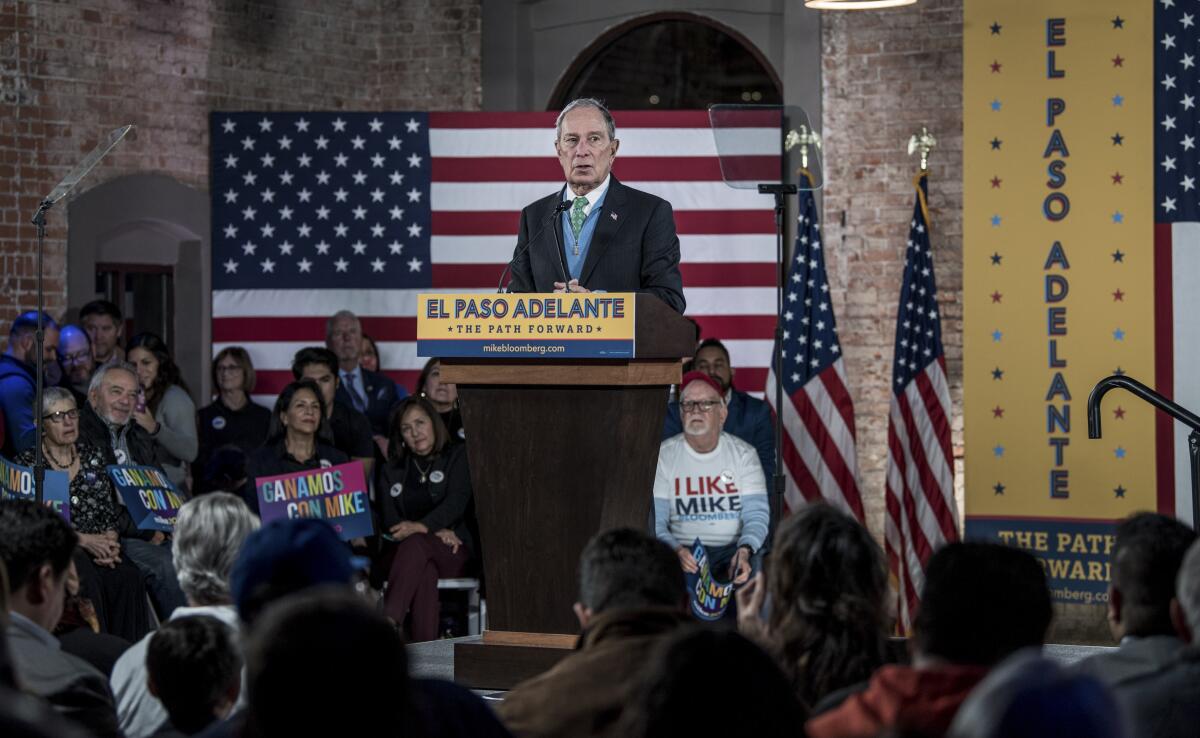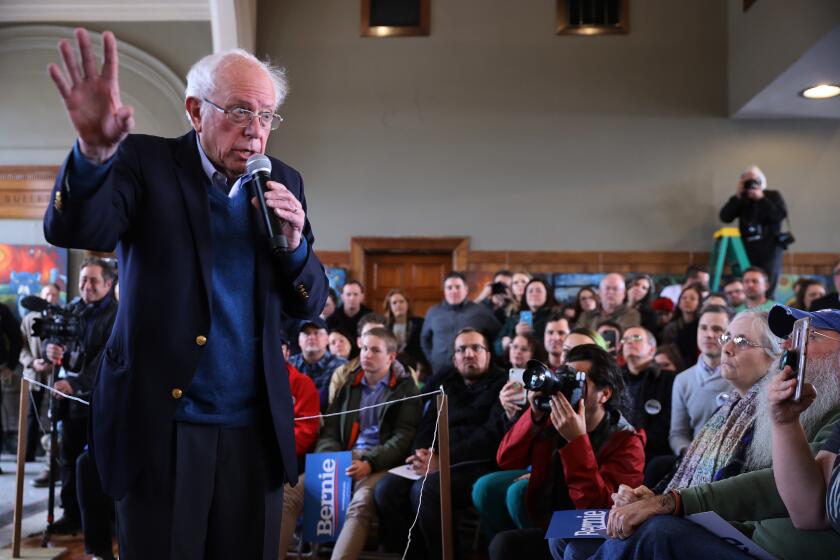A sideshow no more: Michael Bloomberg’s fast ascent unnerves rivals

- Share via
EL PASO — This arid border town in the far western reaches of Texas hardly seems to scream Bloomberg Country.
The billionaire former New York mayor has had a rocky history with minority constituents. His Spanish is bad enough to be the subject of frequent parody. The Wall Street culture on which he built his fortune couldn’t be more foreign.
Yet when Michael R. Bloomberg jetted here Wednesday, many in this predominantly Latino community welcomed him like a hometown hero.
“The Russians put Trump in office,” said Roberto Abalos, a 61-year-old who was among the crowd of 300 who turned out to see Bloomberg at El Paso’s old rail depot. “But the American people, the Hispanic community especially, are going to put Mike in office.”
While the other Democratic hopefuls knock one another in the snows of Iowa and New Hampshire, Bloomberg has the rest of America largely to himself.
Fueled by a bottomless bank account, an advertising blitz of unprecedented size and scope and armies of organizers in vast regions other candidates don’t have the resources to staff, the Bloomberg presidential campaign is taking off in unlikely places — like west Texas.
His recent rise in polls — he’s surpassed former Mayor Pete Buttigieg of South Bend, Ind., Sen. Amy Klobuchar of Minnesota and New York businessman Andrew Yang in polling averages nationwide — and his focus on amassing a big advantage when California, Texas and other big, delegate-rich states vote on Super Tuesday, March 3, are turning political forecasting on its head and unnerving rivals.
“I struggle with how to answer where this is going,” said Kyle Kondik, managing editor of Sabato’s Crystal Ball, a University of Virginia publication that tracks campaigns. “It is different than anything we have seen before.” As other candidates swarm Iowa on caucus day Monday, Bloomberg will have California all to himself for a campaign blitz, touching down in Sacramento, Fresno and Compton.
Bernie Sanders leads in the California primary five weeks away, with strong support from younger voters, Latinos and liberals. Elizabeth Warren and Joe Biden trail.
Rivals are increasingly vocal about their agitation. Massachusetts Sen. Elizabeth Warren criticized him recently on MSNBC, noting that Bloomberg, who doesn’t hold regular town halls, hasn’t yet disclosed his tax returns or financial holdings and oversees a media empire where reporters are directed to not investigate the boss.
He’s “skipping the democracy part of this,” she said.
The Progressive Change Campaign Committee, a large group on the left that backs Warren, approached Democratic Party officials about rule changes that would push Bloomberg into the televised Democratic debates if he hit an unspecified level of voter support.
Most candidates covet the exposure debates give them. Bloomberg has kept himself off the stage by refusing to do any outside fundraising, which means he can’t meet the requirement of having a certain number of donors.
“He is both escaping the scrutiny of Iowa and New Hampshire voters who are known for their role in vetting candidates, and he is escaping the scrutiny on the debate stage,” said Adam Green, a co-founder of the group.
But when the Democratic National Committee revised the requirements on Friday so that Bloomberg will now make the debate stage if his polling strength continues, progressive activists and other candidates who labored to meet the donor requirements expressed outrage. The campaign of Vermont Sen. Bernie Sanders accused the committee of rigging the rules to award the billionaire a podium.
American elections are littered with political carcasses of rich folks who tried to use cash to power their way into office. But none ever spent on this scale.
Bloomberg has poured more than $300 million into campaign ad spending. For Super Bowl Sunday alone, he allotted $11 million to claim a full minute of ad time.
The only candidate even approaching his level of spending — Tom Steyer, also a billionaire — has pursued a very different strategy aimed mostly at the first four states to vote and designed to get him on the debate stage. Bloomberg’s fortune, estimated by Forbes at around $60 billion, is more than 30 times larger than Steyer’s.
What you need to know about the Iowa caucuses, including their history, how they work and how influential they will be for Democratic voters picking their 2020 presidential nominee.
The Bloomberg campaign is scaling up at an unprecedented pace. It has 1,000 staffers working from dozens of offices — many signed to contracts running through November. In El Paso on Thursday night, Bloomberg launched the opening of another of what will be 17 Texas offices.
Among the dignitaries on hand to greet him was hometown favorite Beto O’Rourke, the former congressman who dropped out of the presidential race weeks before Bloomberg plunged in as a very late entrant.
“I like that he is here,” O’Rourke said during a brief interview. “I strongly believe we have a chance to deliver the [state’s] 38 electoral college votes to the Democratic nominee. But it won’t happen of its own accord. It’s going to take a massive level of organizing and a significant investment.”
“The fact that he’s willing to do that … bodes very, very well for the state, and may bode well for his candidacy.”
O’Rourke hasn’t endorsed anybody. But his presence at the event reassured more than a few that Bloomberg is worth their support.
“It’s a good sign,” said Alexis Archuletta, a 20-year-old student who had hoped to vote for O’Rourke and is now bullish on Bloomberg. “Bloomberg is like the cream of the crop.”
After spending so much money over the years on liberal candidates and causes — and suggesting he might spend $1 billion to defeat President Trump, whether he wins the Democratic nomination or not — Bloomberg has an intimidating network of political heavyweights speaking highly of him.
Bloomberg ads are saturating Facebook, and his army of techies are spending with abandon to vacuum up every available byte of data they can use to fine-tune the campaign’s targeting and expand its reach.
But there is one crucial variable Bloomberg can’t control: Joe Biden.
Bloomberg’s strategy makes a big bet that Sanders or Warren will best the former vice president early on from the left, leaving many centrist voters looking for a viable pragmatist to back.
“All of this investment has gotten him in the anteroom to the nomination,” said Robert Shrum, director of the USC Dornsife Center for the Political Future. “If the door opens, it will be because Biden falters or falls apart.”
Bloomberg’s allies are open about this: “One thing you don’t want to happen is one of the moderate candidates sweeping through the early states,” said Bradley Tusk, a longtime advisor to the billionaire.
“But if Bernie Sanders is surging and he wins Iowa and New Hampshire, Mike could become the only obstacle between Sanders and the nomination.”
Voters like 82-year-old David Buchmueller in El Paso are already looking to Bloomberg as the salvation for moderates.
“I’m really afraid that Joe Biden, who I like, has been passed by life,” Buchmueller said. “That brings me to Mayor Bloomberg, who had a spectacular record as mayor in New York City.”
The former mayor’s comments at the El Paso event were tightly scripted and, as is often the case, he didn’t stick around to mingle with voters or gaggle with reporters. But the message — pillorying what he called Trump’s cruelty toward immigrants and empowerment of white supremacists, along with the unveiling of his economic plan for Latinos — was well received.
Here, and at other stops, he made a particular point of appealing to nonwhite voters — trying to shore up a weak spot in his support.
In Houston before a large audience of African Americans at the AME Church’s Future of Black America Symposium a few hours before his El Paso event, Bloomberg talked about his white privilege.
“If I had been black, I wouldn’t have had the same opportunities, and my life would have turned out very differently,” he said. “Many black Americans of my generation would have ended up with far more wealth if they had been white.”
The steady increase of support for Bloomberg among nonwhite voters worries rivals. With racial justice and law enforcement accountability front and center in this primary, many thought the aggressive policing methods Bloomberg backed as mayor would disqualify him with voters.
Nina Turner, a national co-chair of Sanders’ campaign, took a pointed jab at that history when she followed Bloomberg on Wednesday onstage in Houston.
“No ‘stop and frisk’ on Sen. Bernie Sanders’ watch,” she declared.
But a formidable slate of black leaders allied with Bloomberg has helped drown out such criticism. San Francisco Mayor London Breed, former Philadelphia Mayor Michael Nutter and Washington Mayor Muriel Bowser, who endorsed Bloomberg on Thursday, have spoken on his behalf, arguing that he has done more to empower minorities than any of the other candidates.
The endorsements bolster the biographical sketch voters targeted by Bloomberg are being inundated with, one that stresses the immense investment Bloomberg’s philanthropies and advocacy groups have put into fighting the gun lobby, curbing climate change and renewing urban economies.
Many of the endorsements have a transactional scent — the mayors backing him often represent cities that won lucrative grants from Bloomberg’s foundation. But that hasn’t blunted their appeal.
“All black voters are not the same,” Nutter said, arguing that the Democrat who is going to win over the most black voters is the one voters are most confident can win the White House. He recalled a house party he was at recently in Charlotte, N.C., with dozens of African Americans.
“The primary concern of the overwhelming majority of the folks in that house,” Nutter said, “was who can beat Donald Trump.”
More to Read
Get the L.A. Times Politics newsletter
Deeply reported insights into legislation, politics and policy from Sacramento, Washington and beyond. In your inbox twice per week.
You may occasionally receive promotional content from the Los Angeles Times.












